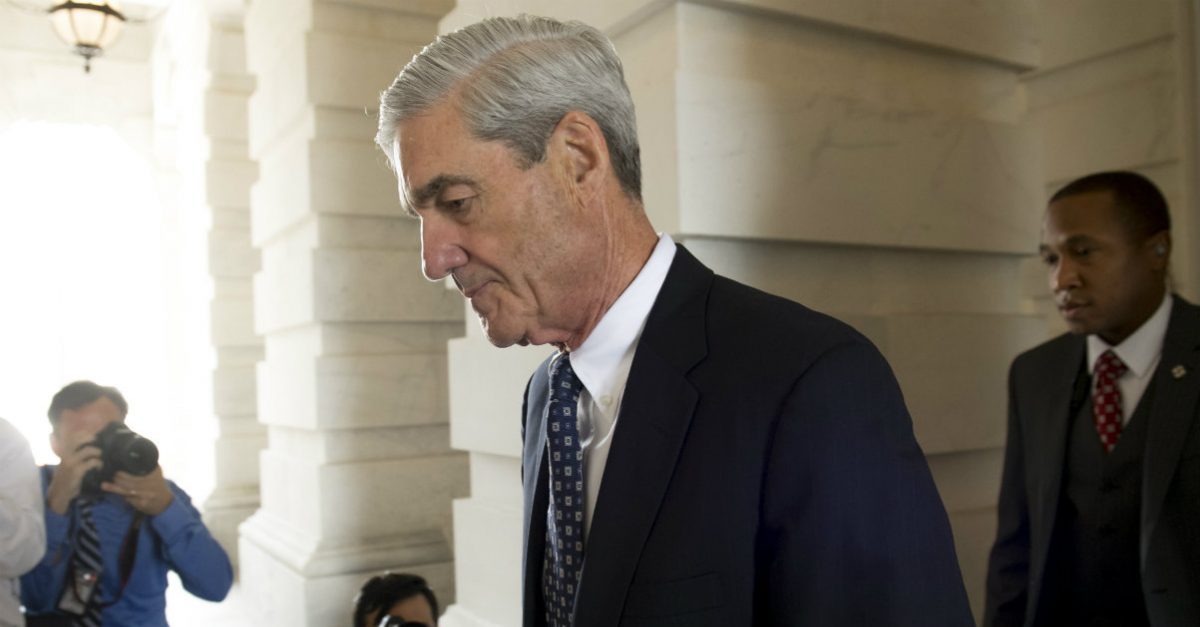
Special Counsel Robert Mueller‘s Russia report will finally be released to the public on Thursday. At least, a lot of it will be. Attorney General William Barr said he’d be making significant redactions before the release. For those wondering what could possibly be behind the black bars that will cover portions of the text, here are the types of information that we already know will be kept hidden.
1. Intelligence Sources and Methods
Classified information related to intelligence sources and methods will be redacted from the report. Such information is generally kept away from public view, because it could expose American intelligence assets, placing people and operations in danger. Remember, the Russia investigation began as a counterintelligence probe into Russian efforts to interfere with the 2016 election.
2. Information on Peripheral/Uncharged Third Parties
This is something that Deputy Attorney General Rod Rosenstein has spoken about before. He has expressed some strong feelings about protecting people who are not accused of committing crimes, and keeping the public (and media) from discussing them as if they’ve done something wrong.
“Punishing wrongdoers through judicial proceedings is only one part of the Department’s mission. We also have a duty to prevent the disclosure of information that would unfairly tarnish people who are not charged with crimes,” Rosenstein said. “In 1941, Attorney General Robert Jackson explained that disclosing information about federal investigations to Congress could cause ‘the grossest kind of injustice to innocent individuals,’ and create ‘serious prejudice to the future usefulness of the Federal Bureau of investigation.’”
3. Information That Would Jeopardize Ongoing Federal Prosecutions
As the head of the U.S. Department of Justice, Attorney General Barr doesn’t want to risk hurting any other cases his office is pursuing. This could include evidence related to the Southern District of New York’s investigations of the hush payments made to Stormy Daniels and Karen McDougal, and the Trump Inaugural Committee.
4. Grand Jury Information
This is likely to be the most contentious category. While Barr has stated that he would work with Congress about giving them access to some of the other types of redacted information, he held firm on this one. Rule 6(e) of the Federal Rules of Criminal Procedure discusses how grand jury information is to remain secret, with certain exceptions. At a recent congressional hearing, Barr alluded to the recent D.C. Circuit Court decision in McKeever v. Barr, which said that courts aren’t allowed to order the disclosure of grand jury information except for in the situations specified by Rule 6(e). Those exceptions are:
(i) preliminarily to or in connection with a judicial proceeding;
(ii) at the request of a defendant who shows that a ground may exist to dismiss the indictment because of a matter that occurred before the grand jury;
(iii) at the request of the government, when sought by a foreign court or prosecutor for use in an official criminal investigation;
(iv) at the request of the government if it shows that the matter may disclose a violation of State, Indian tribal, or foreign criminal law, as long as the disclosure is to an appropriate state, state-subdivision, Indian tribal, or foreign government official for the purpose of enforcing that law; or
(v) at the request of the government if it shows that the matter may disclose a violation of military criminal law under the Uniform Code of Military Justice, as long as the disclosure is to an appropriate military official for the purpose of enforcing that law.
In 1974, a court did order the disclosure of grand jury information from the Watergate investigation, which Democrats could cite should this issue go before the courts now. The judge who wrote the McKeever decision said in a footnote that this was allowed because the House’s impeachment investigation fell under the “judicial proceeding” exception in Rule 6(e).
Even in the Watergate matter, however, the judge ruled that the grand jury information could be released to Congress, but not the public. It was only in 2018 that the sealed Watergate “road map” was released to the public, and even then grand jury information was redacted.
This means that even if Congress manages to get their hands on the full Mueller report, there’s a good chance the public never will.
[Image via SAUL LOEB/AFP/Getty Images]